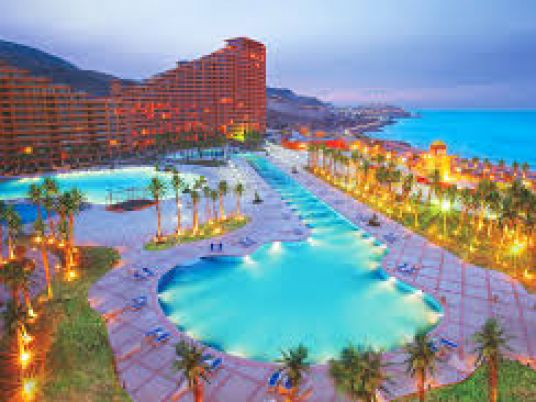Last December, the Tourism Development Authority (TDA) allocated large chunks of land located in the North of Lake Qarun Protected Area to the real estate developer Amer Group.
The North of Lake Qarun area has been a protected prea since the 1980s, and its boundaries have expanded gradually to include Gebel Qattrani, a desert filled with archaeological and geological treasures. The site has been proposed as a UNESCO World Heritage Site.
A group of environmental activists recently launched a Facebook campaign to alert the community of Amer Group’s potentially devastating development plans. After building “Porto Marina” over the site of an ancient Greco-Roman Port on the North Coast in 2005, the group built its second monumental resort on the once pristine Red Sea coast, “Porto Sokhna.”
Environmentalists are worried the company may develop a similar resort on the lake’s shores, thus endangering the archaeological remains and violating laws that regulate protected areas. To have their voice heard, they launched a petition and created a Facebook group to stop any development project.
The Amer Group was granted 650 acres of land for a total of US$28,000 according to the American Chamber of Commerce. The group immediately announced its plan to dedicate 2.8 million square meters for the new development of “Porto Fayoum” in order to boost tourism and employment in the area.
No building of any sort has emerged yet out of the ground, but environmentalists are watching closely for any type of development. What worries environmental activists from Nature Conservation Egypt (NCE) and “Friends of Lake Qarun” is the ongoing road construction along the lake’s northern shore. “The road was already 40 km long last June,” exclaims Mindi Baha al-Din, an active member of NCE. “The road is a very serious threat to the area, she explains, because it is being constructed in a very careless manner and approaches the boundaries of the proposed World Heritage Site.”
Although the identity of who is behind the construction of the road is unknown, environmentalists suspect it is financed by TDA. When completed, the road will connect the remote area of Lake Qarun with Cairo.
Mostafa Foda, an advisor for EEAA, was infuriated when he discovered that a road was being built within the protected area. “It took me and NCE some time to figure out that a road was under construction because we had limited resources and just an old car to patrol the area,” he explains. Until 2010, when he retired and became an advisor to the Minister of Environment, he was working for the EEAA and managed to halt construction of the road. As soon as he retired, construction resumed, and according to him, the road is currently 44 km long.
According to Rebecca Porteous Fahmi, one of the founders of an NGO called “Friends of Lake Qarun,” the TDA has clashed constantly for the past 10 years with the EEAA, which has jurisdiction over Protected Areas. “The problem is that the TDA was a much more powerful entity under Mubarak’s regime than the EEAA, a fact which explains why the EEAA has been unable to put an end to constructing the road,” she explains.
According to the law that regulates protected areas, development projects are forbidden except if both the Ministry of Environment and the Supreme Council of Antiquities (SCA) agree to give the land to the TDA. When the TDA granted large chunks of the land on the North of Lake Qarun to developers, neither the EEAA nor the SCA appear to have blocked the transaction.
Mindy Baha al-Din was furious when she discovered that the SCA had not taken the land out of the grip of the TDA. “This site has global importance,” she explains. “How can the SCA allow the construction of a road inside a PA when there are so many archaeological remains so close by?” she wonders.
The North Shore of Lake Qarun and Gebel Qattrani contains treasures of geology, paleontology and wildlife. Of the 25 mammal fossils that have been discovered in the world, 13 have been excavated on this site. Just last year, excavations in Gebel Qattrani revealed complete fossil remains of a prehistoric whale that was new to science.
No one is more enthusiastic about the amazing findings in the North Shore of the Lake than Khaled Saad, the archaeologist from the SCA who led a mission in 2009-2010 to excavate a 10 km strip on the lake’s shore along with 60 other scientists.
He explains that the SCA, conscious of the area’s potential, refused to give the TDA full authority over the area without first conducting excavations. “Hawass was very clear: he told the TDA that they could have the land after we were done exhuming all the treasure it contains,” Saad explains.
The mission, financed by the TDA up to LE6.5 million, focused on a 10 km strip as a pilot project. Now that all the archaeological remains have been excavated, most of them discovered at ground level, Saad wants to move on to another strip close by.
“Although the strip we excavated represents only 10 percent of the whole area, we discovered treasures [dating] from prehistoric times to the period of Mohamed Ali,” he exclaims with delight, stressing that remains of fossilized whales, crocodiles, turtles as well as the Islamic and Coptic artifacts where mostly discovered at the surface.
“To give this area justice, we would need 10 years to excavate it thoroughly,” he says, adding that the ideal would be to transform the whole area into an open-air museum, so it could become the best tool in the world to study evolution. Baha al-Din also believes that the best option would be for Gebel Qattrani to become Egypt’s first Geopark. A Geopark is an area with a distinct geological heritage and strategy for sustainable economical development. Such development may benefit the local community. Turning the area into a Geopark would be the first step to making the area a World Heritage Site.
Zahi Hawass, after being accused by the NCE of having abandoned such an important area to TDA, issued a statement on his website last week to counter charges made against him. “I will appoint a committee next week to go there again [to Lake Qarun] and examine the area further before we decide how to proceed,” he wrote. “At present, the site is completely under the MSA's responsibility and no one else has touched it,” he added.
Indeed, the SCA is currently trying to obtain jurisdiction over the Ministry of Tourism, according to the state-run Al-Ahram.
“This is a very positive development, says Baha al-Din, but even if we manage to stop destruction of Lake Qarun, what will come next?” she wonders.



